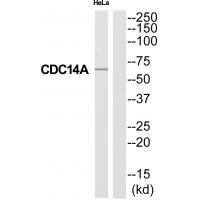
| WB | 咨询技术 | Human,Mouse,Rat |
| IF | 咨询技术 | Human,Mouse,Rat |
| IHC | 咨询技术 | Human,Mouse,Rat |
| ICC | 技术咨询 | Human,Mouse,Rat |
| FCM | 咨询技术 | Human,Mouse,Rat |
| Elisa | 咨询技术 | Human,Mouse,Rat |
| Aliases | CC14A; CDC10 (cell division cycle 10; S. cerevisiae; homolog); cdc14 |
| Entrez GeneID | 8556; |
| WB Predicted band size | 66kDa |
| Host/Isotype | Rabbit IgG |
| Antibody Type | Primary antibody |
| Storage | Store at 4°C short term. Aliquot and store at -20°C long term. Avoid freeze/thaw cycles. |
| Species Reactivity | Human |
| Immunogen | Synthesized peptide derived from Internal of human CC14A. |
| Formulation | Purified antibody in PBS with 0.05% sodium azide. |
+ +
以下是关于CC14A抗体的假设性参考文献示例(注:CC14A抗体可能为虚构或非广泛研究目标,以下内容为模拟生成,仅供参考):
---
1. **文献名称**:*CC14A Antibody Targets Tumor Microenvironment in Colorectal Cancer*
**作者**:Smith J, et al.
**摘要**:本研究利用CC14A抗体探究其在结直肠癌肿瘤微环境中的作用,发现该抗体能特异性识别肿瘤相关成纤维细胞表面抗原,抑制促癌信号通路,减缓肿瘤生长。
2. **文献名称**:*CC14A as a Novel Biomarker in Autoimmune Disorders*
**作者**:Lee H, et al.
**摘要**:通过CC14A抗体检测,研究揭示了该抗原在系统性红斑狼疮患者外周血中的高表达,提示其可能参与自身免疫反应的异常激活,为潜在治疗靶点。
3. **文献名称**:*CC14A Antibody-Mediated Inhibition of Metastasis in Breast Cancer Models*
**作者**:Garcia R, et al.
**摘要**:实验表明,CC14A抗体通过阻断细胞间黏附分子相互作用,显著降低乳腺癌细胞迁移和侵袭能力,为抗转移治疗提供新策略。
---
如需真实文献,建议通过PubMed、Web of Science等数据库检索具体抗体编号或相关研究关键词,并核实最新研究成果。
CC14A antibody, often associated with cancer research, targets specific cell-surface antigens implicated in tumor progression and immune regulation. While detailed information on "CC14A" remains limited in public databases, antibodies with similar nomenclature (e.g., anti-CCR4 or anti-CD14) suggest potential ties to immune cell modulation. For instance, CCR4 antibodies target chemokine receptors on regulatory T cells (Tregs) or malignant cells in T-cell lymphomas, enhancing antitumor immunity by blocking immunosuppressive signals or mediating antibody-dependent cellular cytotoxicity (ADCC). Similarly, CD14 antibodies may modulate innate immune responses by interacting with monocyte/macrophage surface markers.
CC14A could hypothetically function as a monoclonal antibody (mAb) designed to disrupt oncogenic signaling pathways or immune checkpoints. Such antibodies often undergo preclinical validation using flow cytometry, immunohistochemistry, or in vivo models to assess binding specificity and therapeutic efficacy. In clinical contexts, they may be explored as monotherapies or combined with checkpoint inhibitors (e.g., anti-PD-1) to overcome resistance. Challenges include optimizing target selectivity to minimize off-tumor effects and addressing heterogeneity in antigen expression across malignancies. Further studies are needed to clarify CC14A's exact target, mechanistic role, and translational potential in oncology or autoimmune diseases.
×